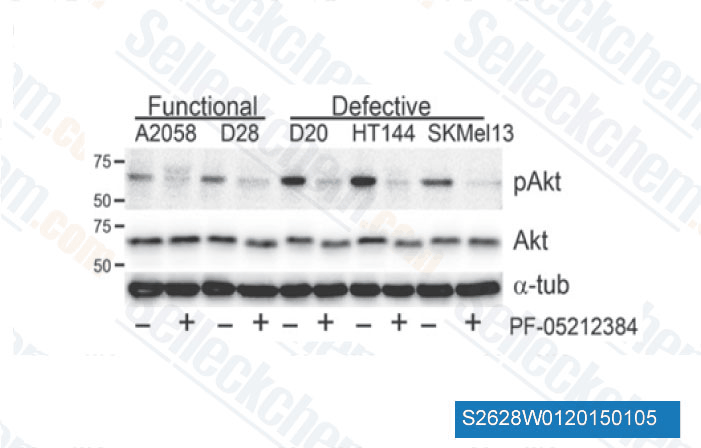|
How to Cite 1. For In-Text Citation (Materials & Methods): 2. For Key Resources Table: |
||
|
Toll Free: (877) 796-6397 -- USA and Canada only -- |
Fax: +1-832-582-8590 Orders: +1-832-582-8158 |
Tech Support: +1-832-582-8158 Ext:3 Please provide your Order Number in the email. We strive to reply to |
Technical Data
| Formula | C32H41N9O4 |
||||||
| Molecular Weight | 615.73 | CAS No. | 1197160-78-3 | ||||
| Solubility (25°C)* | In vitro | DMSO (warmed with 50ºC water bath) | 10 mg/mL (16.24 mM) | ||||
| Water | Insoluble | ||||||
| Ethanol | Insoluble | ||||||
| In vivo (Add solvents to the product individually and in order) |
|
||||||
|
* <1 mg/ml means slightly soluble or insoluble. * Please note that Selleck tests the solubility of all compounds in-house, and the actual solubility may differ slightly from published values. This is normal and is due to slight batch-to-batch variations. * Room temperature shipping (Stability testing shows this product can be shipped without any cooling measures.) |
|||||||
Preparing Stock Solutions
Biological Activity
| Description | Gedatolisib (PKI-587) is a highly potent dual inhibitor of PI3Kα, PI3Kγ and mTOR with IC50 of 0.4 nM, 5.4 nM and 1.6 nM in cell-free assays, respectively. This compound is currently in Phase 2. | ||||||
|---|---|---|---|---|---|---|---|
| Targets |
|
||||||
| In vitro | Gedatolisib (PKI-587) shows potent inhibitory activity against PI3K-α, PI3K-γ and mTOR with IC50 of 0.4 nM, 5.4 nM and 1.6 nM, respectively. Furthermore, it also exhibits its potency against the most frequently occurring mutant forms of PI3Kα, notably the H1047R and E545K with IC50 of 0.6 nM and 0.6 nM, respectively. Correlated with suppression of phosphorylation of PI3K/mTOR signaling pathway proteins, this compound causes tumor cell growth inhibition in MDA-361 and PC3-MM2 cell lines with IC50 of 4 nM and 13.1 nM, respectively. | ||||||
| In vivo | Gedatolisib (PKI-587) treatment at 25 mg/kg iv in nude mice leads to low plasma clearance (7 (mL/min)/kg), high volume of distribution (7.2 L/kg), and long half-life (14.4 hours). In the MDA-361 xenograft model, it produces potent antitumor efficacy with the minimum efficacious dose (MED) of 3 mg/kg against MDA-361 tumors and maximum tolerated single dose (MTD) of 30 mg/kg. While in the H1975 (non-small-cell lung carcinoma, mutant EGFR [L858R, T790M]) xenograft model, this compound at 25 mg/kg for 7 weeks results in 90% survival of the group treated. |
Protocol (from reference)
| Kinase Assay:[1] |
|
|---|---|
| Cell Assay:[1] |
|
| Animal Study:[1] |
|
References
|
Customer Product Validation

-
Data from [ Pigment Cell Melanoma Res , 2014 , 27(5), 813-21 ]

-
, , Dr. Zhang of Tianjin Medical University
Selleck's Gedatolisib (PKI-587) Has Been Cited by 31 Publications
| Efficacy of NAMPT inhibition in T-cell acute lymphoblastic leukemia [ PLoS One, 2025, 20(6):e0324443] | PubMed: 40526635 |
| Bypassing cisplatin resistance in Nrf2 hyperactivated head and neck cancer through effective PI3Kinase targeting [ bioRxiv, 2025, 2025.01.10.632413] | PubMed: 39868226 |
| AKT1 phosphorylation of cytoplasmic ME2 induces a metabolic switch to glycolysis for tumorigenesis [ Nat Commun, 2024, 15(1):686] | PubMed: 38263319 |
| A multiplex single-cell RNA-Seq pharmacotranscriptomics pipeline for drug discovery [ Nat Chem Biol, 2024, ] | PubMed: 39482470 |
| Assessments of prostate cancer cell functions highlight differences between a pan-PI3K/mTOR inhibitor, gedatolisib, and single-node inhibitors of the PI3K/AKT/mTOR pathway [ Mol Oncol, 2024, 10.1002/1878-0261.13703] | PubMed: 39092562 |
| Functional Assessments of Gynecologic Cancer Models Highlight Differences Between Single-Node Inhibitors of the PI3K/AKT/mTOR Pathway and a Pan-PI3K/mTOR Inhibitor, Gedatolisib [ Cancers (Basel), 2024, 16(20)3520] | PubMed: 39456616 |
| Selective Eradication of Colon Cancer Cells Harboring PI3K and/or MAPK Pathway Mutations in 3D Culture by Combined PI3K/AKT/mTOR Pathway and MEK Inhibition [ Int J Mol Sci, 2023, 24(2)1668] | PubMed: 36675180 |
| RECOVER identifies synergistic drug combinations in vitro through sequential model optimization [ Cell Rep Methods, 2023, 3(10):100599] | PubMed: 37797618 |
| In Vitro Angiogenesis Inhibition and Endothelial Cell Growth and Morphology [ Int J Mol Sci, 2022, 23(8)4277] | PubMed: 35457095 |
| Fibroblast-Induced Paradoxical PI3K Pathway Activation in PTEN-Competent Colorectal Cancer: Implications for Therapeutic PI3K/mTOR Inhibition [ Front Oncol, 2022, 12:862806] | PubMed: 35719951 |
RETURN POLICY
Selleck Chemical’s Unconditional Return Policy ensures a smooth online shopping experience for our customers. If you are in any way unsatisfied with your purchase, you may return any item(s) within 7 days of receiving it. In the event of product quality issues, either protocol related or product related problems, you may return any item(s) within 365 days from the original purchase date. Please follow the instructions below when returning products.
SHIPPING AND STORAGE
Selleck products are transported at room temperature. If you receive the product at room temperature, please rest assured, the Selleck Quality Inspection Department has conducted experiments to verify that the normal temperature placement of one month will not affect the biological activity of powder products. After collecting, please store the product according to the requirements described in the datasheet. Most Selleck products are stable under the recommended conditions.
NOT FOR HUMAN, VETERINARY DIAGNOSTIC OR THERAPEUTIC USE.
